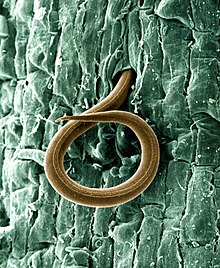Meloidogyne incognita
| Meloidogyne incognita | |
|---|---|
 |
|
| Scientific classification | |
| Kingdom: | Animalia |
| Phylum: | Nematoda |
| Class: | Secernentea |
| Order: | Tylenchida |
| Family: | Heteroderidae |
| Genus: | Meloidogyne |
| Species: | M. incognita |
| Binomial name | |
|
Meloidogyne incognita |
|
Meloidogyne incognita is a nematode (roundworm) in the family Heteroderidae. It is commonly called the "southern root-knot nematode" or the "cotton root-knot nematode". This parasitic roundworm has worldwide distribution and numerous hosts. It is an important plant parasite classified in parasitology as a root-knot nematode, as it prefers to attack the root of its host plant.
When M. incognita attacks the roots of plants, it sets up a feeding location, where it deforms the normal root cells and establishes giant cells. The roots become gnarled or nodulated, forming galls, hence the term "root-knot" nematode.
M. incognita has been found to be able to move along shallower temperature gradients (0.001C/cm) than any other known organism, an example of thermotaxis. The response is complicated and thought to allow the nematodes to move toward an appropriate level in soil, while they search for chemical cues that can guide them to specific roots.
...
Wikipedia
